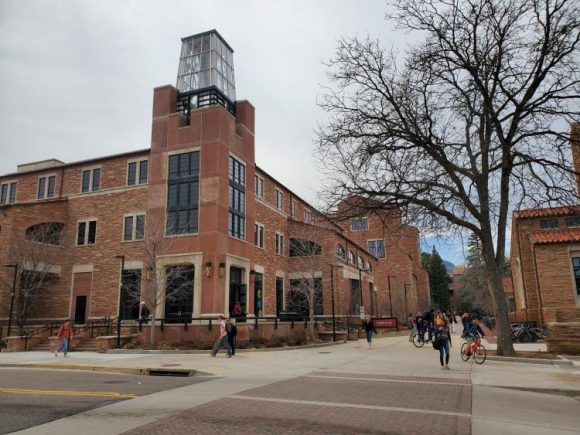
The Roser ATLAS building at CU Boulder. (Photo courtesy of the University of Colorado Boulder)
The Rocky Mountain AI Interest Group hosted a meeting regarding the use of artificial intelligence in law in the Roser ATLAS Center on Nov. 13. The meeting featured multiple speakers from both STEM and legal fields, with professionals and members of RMAIIG filling the audience.
As a community organization, RMAIIG offers opportunities to converse about new AI technologies like ChatGPT, which generated much discussion at the University of Colorado Boulder earlier this year.
Michael Drapkin, the CEO of Paximal and an adjunct professor at the CU Law School, spoke first on the utilization of AI in law. Paximal uses AI to cut down the patent application process, which is otherwise a service offered by patent attorneys.
“It usually takes 16 to 20 weeks, often much more time,” said Drapkin regarding the typical patent process. “We really think that a patent should be filed in five days and not five months.”
Speaker and technologist Jason Adaska discussed ways law firms could use these technologies to reduce unnecessary workloads and defended against concerns that AI would cut corners within the legal profession.
“With the newer models, they can actually do logical inference and reasoning,” he said.
Using AI may also expand access to legal services for people financially, according to Adaska. He said AI tools can cut down the time needed to complete paperwork, allowing lawyers to move from billing clients on a per-hour basis to a simple flat fee.
“We’re leaving out a huge class of people,” said Drapkin about the current billing processes in the legal field.
Other speakers agreed that AI will have a dramatic impact on companies that normally charge by the hour.
“I really think the billable hour is dead,” said Tamara Pester Schklar, a trademark attorney who spoke at the event.
Schklar also spoke about the copyright implications of AI-assisted works. She said the technology has created new legal questions, like how much human authorship is required to copyright a work.
“According to [copyright law], human authorship is required. It will not register something that is produced by a machine or mechanical process that operates randomly or automatically without creative input or intervention from a human,” said Schklar. “So the question we grapple with is whether the work is one of human authorship, [whether] the traditional elements of authorship were conceived and executed by a human.”
As intellectual property concerns expand and complicate, Schklar said students must keep up with these new technologies. CU Boulder’s Law School has brought awareness to these emerging tools by hosting an AI ethics lecture series that most recently debated the use of ChatGPT in the legal profession.
“I hope that in the law schools, professors are keeping abreast of cases and challenging the students to think about these things in new and different ways,” Schklar said.
Contact CU Independent Staff Writer Greta Kerkhoff at greta.kerkhoff@colorado.edu.
